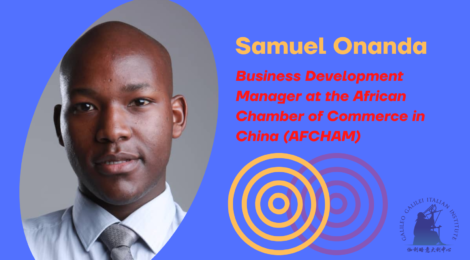
Galilei Circle of Friends – Interview with Samuel Onanda
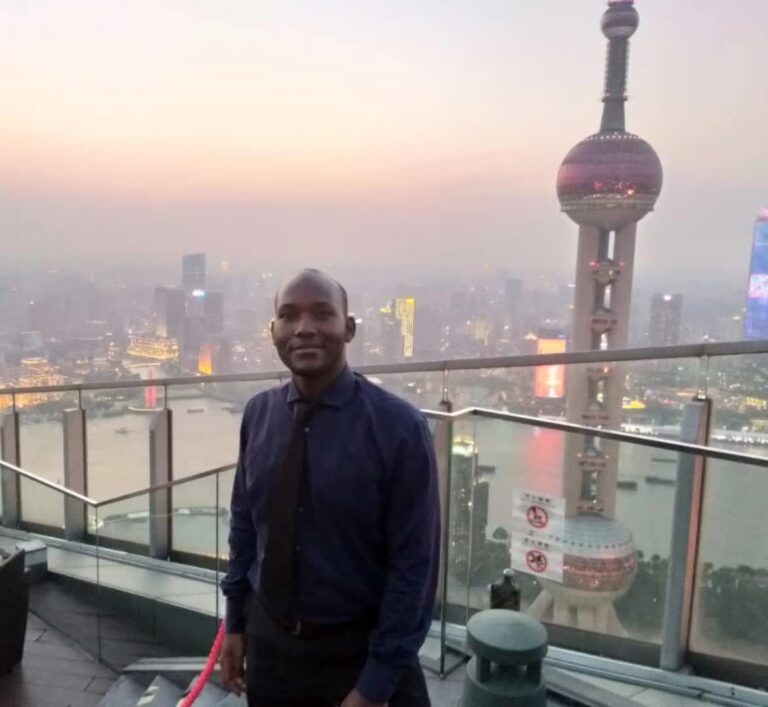
Sam Onanda is the Business Development Manager at the African Chamber of Commerce in China (AFCHAM) and the General Manager of the African Marketplace, an AFCHAM trade initiative to promote made in Africa products in key export markets.
Since launching the African Marketplace project, Onanda has developed trade and enterprise in 3 continents. His role has enhanced public private partnerships for joint ventures in crossborder commerce with endorsements and recognition from established MNCs and SOEs.
His work is recognised by the China, Uganda, Madagascar, Ghana, and Mauritius governments with the launch of the first African Import Mall and a permanent trade hub in Shanghai, China.
Enjoy his successful story!
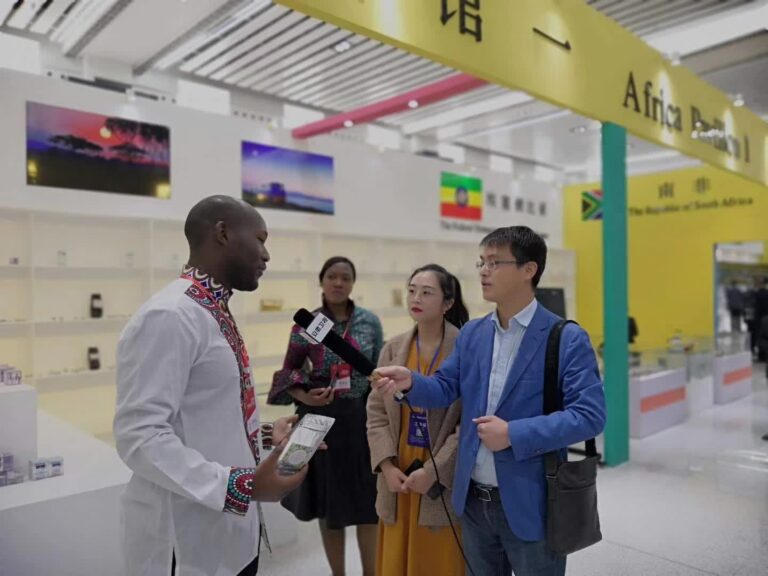 INTRODUCTION – Personal relationship with China
INTRODUCTION – Personal relationship with China
How did your experience with China begin? Was it a casual meeting, related to your work, for pleasure?
I studied Chemistry at the University of St Andrews in the UK. In 2006, I subscribed to Chemistry World, a magazine from the Royal Society of Chemists. An article in one of the monthly editions read that Shanghai, China would be the pharmaceutical capital of the world. This was a theme that followed many publications at a time when I was planning my future after education. When the recession hit the UK, I made it a priority to start looking for opportunities in China. I specifically applied for jobs at companies that had offices in China. I was convinced my success was going to be in China, so I planned for it.
How has your relationship with China evolved over time? Have you been based in the country or you have been traveling from Africa to China often? Which city did you choose in particular to start your Chinese experience? And why? What has your experience in this country taught you at a personal level?
I arrived in Shanghai, China in autumn 2008. I was very unprepared. I barely spoke the language; I had packed the wrong clothes for the coming cold of Shanghai winters, and I didn’t even know how to use chopsticks. Another obstacle was my sense of entitlement. I thought because of my education and background I could walk into any job. China reminded me how that is not true, ever. With an employment market of hundreds of millions, I had to change my attitude fast. I had to remind myself that nothing could be achieved without hard work and perseverance. So, despite the setbacks I got myself a Chinese language tutor, practiced using chopsticks, and challenged my privilege by transferring my skills into new opportunities as and when my network in China grew. I never lost touch with my family or friends back home and I made sure I travelled back regularly. I would spend a month every year between Kenya and the UK before returning to China. This helped me stay focused on what I really wanted to achieve in my career.
BUSINESS in China and with China
Tell us about your business experience in China. What is your role and what are the main results you have achieved over the years?
I have worked in Shanghai, China for over 13 years in a variety of industries but the duties and responsibilities have rarely changed. In publishing I oversaw developing ad sales for a magazine educating Chinese customers about study overseas opportunities. In education I oversaw developing admission sales for schools educating Chinese students about study overseas opportunities. In 2016 I learned about the opportunity to develop sales by educating Chinese clients about the investment opportunities in Africa with the African Chamber of Commerce in China (AFCHAM). When I first came to China a role like this was exclusively for state level officials. However, since the Forum on China Africa Cooperation (FOCAC), political interest in Africa’s development grew. So too did the business interest. AFCHAM grew in response to this increased interest and has provided much needed solutions to businesses engaging in Sino-African activities and bridging public and private partnerships.
In response to China’s growing interest in Africa, I transitioned from life as an employee to life as a business owner. I felt that the skill I most needed to develop was the ability to think like a business owner. I may understand the culture of Kenya, UK and China, as a citizen and guest, but to understand the business culture in these areas was a different concept entirely. I knew I needed to get this right from the start, or I would have lost a lot of clients. Speaking the language opened the right doors but empathising with the struggles of common businesses was crucial to my growth. I had to learn about the obstacles in creating new markets, retaining staff and finding finance if I was to build long lasting business relationships. I spent two years working in procurement as a trainee agent, representing foreign clients sourcing items from China, understanding their problems, providing a variety of solutions and advising them on how to do business profitably in China.
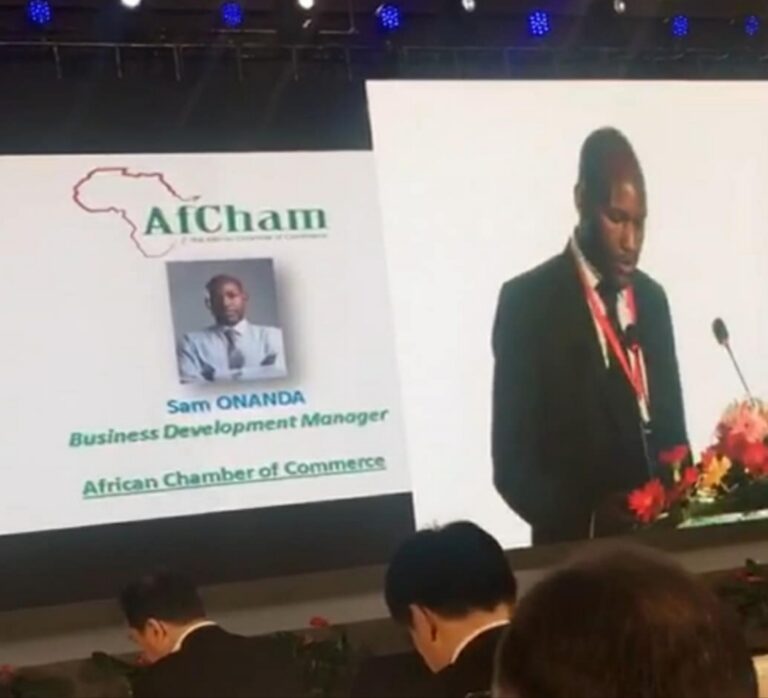
How important is it to know the local culture and language in your business?
Being an entrepreneur and manager in China, Kenya, and the UK, I am always experiencing the magic of relationship building. This is something that cannot be done solely from an online encounter. No matter how fruitful. It makes sense to experience the local business culture first-hand and learn the language to develop a positive relationship. Especially if the relationship is with the representative responsible for developing my brand with my target audience. Without this positive relationship and first-hand experience, there is no way to communicate the urgency or the value of my brand to the consumer or end customer. This needs to be addressed and built upon over several extensive meetings, so nothing is lost in translation.
How did the pandemic affect your business and what strategies have you implemented since its outbreak to respond to the crisis?
I left China just before the pandemic hit. I had planned to explore opportunities with the Africa Trade Summit then return to China. However, when lockdown guidelines limited my travel, it also restricted my access to new clients. I had to shift my business networking opportunities to online meet ups. However, the circumstances brought me closer to existing customers. Despite the challenges, I was able to expand the business to the UK, however I support businesses differently from the way I do in China.
My services have adapted to offer equipment that not only lowers manufacturing costs but also adds value to semifinished products in the coffee and garment industry. The machines increase the product retail price while lowering the manufacturing costs. Because I shifted my business online, I was able to reach new markets including in the USA, where I partnered with the head of the USA Trade with Africa Summit.
Having not been in China for almost 5 years, it has been difficult for my business to meet with state level officials as we did previously. The change in circumstances has allowed me to adapt to remote and hybrid working as well as focus on developing the industry led interests in Africa.
What are the main challenges you have encountered in your experience as a successful manager in China? What are the positive surprises?
I opened China’s first African import mall at the China International Import Expo in Shanghai. This 10-day exhibition brought together trade delegations from 10 African nations and was recognised by the Chinese government as well as city officials from a variety of Chinese trade hubs. This opportunity was a huge challenge because of the sudden demand for premium, speciality, made in Africa’s agriproducts. I had to provide solutions that created added value along the value chain. I decided to open a company in China that offered this specific service.
I travelled China with AFCHAM receiving incredible support from the China Association of Trade in Services, China Council for the Promotion of International Trade, Investment Association of China and the local city/municipal governments of West Hongqiao(Shanghai), Huabei and Hefei (Anhui), Huoma and Quwo (Shanxi province), Shenzhen and so many more places that understood and have been ready to exploit the potential of made in Africa products. I was invited to speak at events such as expos, networking workshops, and investment summits, educating the Chinese market about adding value along Africa’s agriculture value chain. This involved explanations on how to best utilise the existing trade initiatives (such as the Belt and Road Initiative) to invest in Africa sustainably. In this way, I attracted Chinese clients buying and selling to China and African clients looking for investment in their varied agriculture value chains. These business promotion activities helped importers start stocking at the African Import Mall. The facility soon transitioned from a temporary exhibition space to a permanent structure beside the National Exhibition Centre in Shanghai.
How important is the role of technology in your business? From this point of view, is it an advantage for your company to be able to operate in China?
Technology has helped me improve my global network and market my services online; however, technology can do so much more. I look forward to technology developing in agri-data infrastructures where data on supply chain resources and shortfalls can be readily available to public and private stakeholders. This will make my job a lot easier as I will not only explain where investment is needed but I can also show in real time how investment can address the shortfalls. Furthermore, technology in traceability will make providing proof of product, quality control and assurances, so much easier during the due diligence stage of agri-investments. The opportunity is still there to exploit.
Are you also active in Africa? Or only in China?
My activities in China attracted a lot of attention in Uganda where I have recently formed a partnership with Uganda coffee cooperatives. Our initial contact was online before meeting offline in China in 2019 and in Uganda in 2023. It was during my most recent visit that I met the coffee growers and had a tour of their coffee farms and roasteries. Having visited the farms myself, I can better communicate the value-added potential with my own first-hand experiences. When clients have felt, tasted, and experienced made in Africa products, a sale is almost guaranteed. Because of this I always encourage my clients to join my trips in China or Africa and explore opportunities in opening an office there.
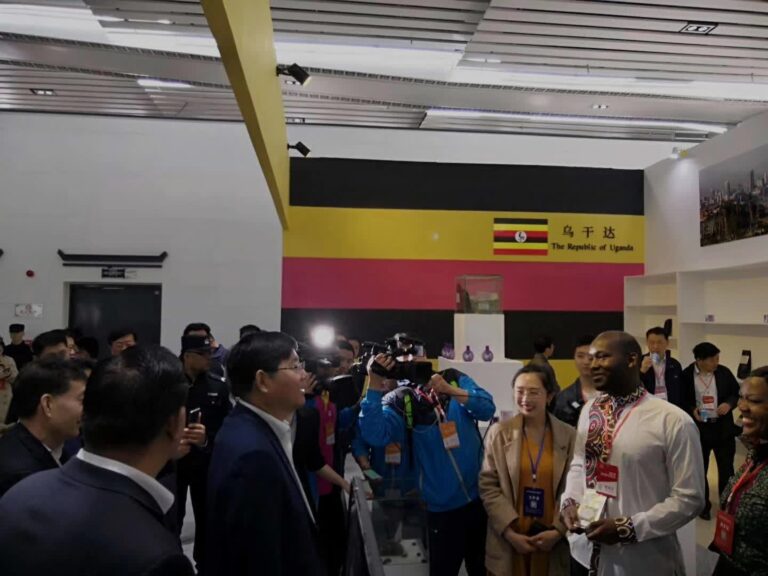
GOING EAST – Why does being in China make sense for an African manager/entrepreneur? Why does it still make sense to focus on the Chinese market for an African company and what are the opportunities in particular in the part of the country where you operate?
China is still a massive export opportunity for made in Africa goods because of the increased and increasing appetite for quality, speciality, and premium made in Africa goods by one of the most populous nations in the world. Effectively communicating that quality, speciality, and premium brand is the continued challenge and highlights the work still to be done.
In Shanghai, I used to regularly host expos and trade events that brought together public and private stakeholders. I educated market leaders and prepared them to purchase made in Africa goods. In the absence of these meetings, numbers of orders have stagnated. I am convinced that once I return, I can rekindle the passion for made in Africa goods and drive the market demand to rise once again.
Are you already present in Chongqing or in the Chengdu-Chongqing economic circle?
How can the Galilei Institute and Sant’Anna school in Chongqing be useful to your company in southwestern China?
I am excited at the platform Galilei Institute and Sant’Anna School gives to better educate investors and stakeholders. The value-added potential of made in Africa products has still not been fully exploited. The shared expertise can be transferred to the rest of China and to additional nations in the Belt and Road Initiative (BRI). The historically infamous silk road benefitted everyone on it. To be involved in this momentous trade initiative leaves no country behind and will economically propel all participating BRI nations forward. Communicating these exciting prospects accurately is the answer Gallilei Institute and Sant’Anna School can provide. Strategically placed in the west of China, where China borders with major trade partners and hosts the China Africa Economic and Trade Expo (Hunan), puts this establishment at another advantage. With the vast population in this region looking for employment and business growth opportunities, now has never been a better time to accelerate economic growth.
In Shanghai, I have seen how made in Africa products such as coffee were utilised to create companies and provide employment opportunities for locals. Demand in African coffee created roasteries which in turn created restaurants and cafes. Food and beverage experts were employed to sell products to the excited consumers and customers. Not to mention the increased company growth and people employed in logistics industries.
The end customer continues to learn about the different tastes they are experiencing with every quality, premium, cup of specialty African coffee. This indicates the demand is still there. With the growth of middle class in the Chengdu Chongqing Economic circle I can only surmise similar or better results. But only if the opportunity is properly taken.
Interview by Marco Bonaglia & Jilles Djon



